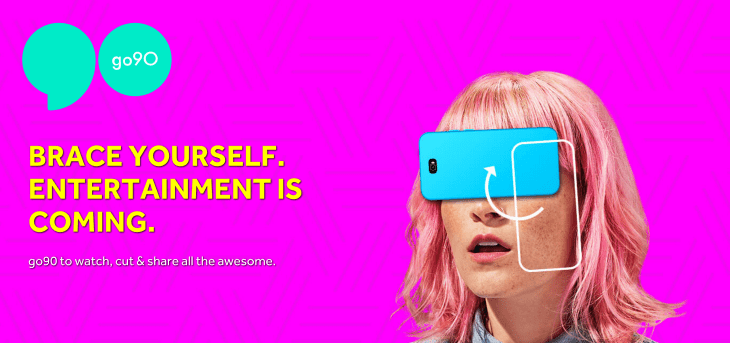Verizon’s new mobile video service dubbed Go90 is launching this week, a report from The New York Times confirms. Verizon tells us the service is actually debuting into beta with Verizon Wireless customers and subscribers from other carriers starting today, with a broader rollout planned for the end of the month. The service, whose name refers to flipping your mobile device horizontally in order to watch video content, will include a combination of television programming, live events and video from popular web series.
It will also compete against similar offerings from rivals Comcast, which is rolling out its own Internet-based TV streaming service, as well as Dish’s online service Sling TV. And it will go up against offerings from telecom player AT&T in the future.
In a $48.5 billion deal which closed earlier this summer, AT&T took over DirecTV with plans for the merged entity to deliver content to customers across platforms, including on mobile devices.
However, unlike competing services, Verizon [disclosure: TechCrunch parent co.] is heavily focusing on being “mobile first” in order to more specifically target the younger demographic of 18-34 year-olds, 70 percent of whom watch video on mobile devices first, the company told NYT. It’s also making Go90 available to anyone, not only Verizon customers.
Verizon has been steadily announcing partnerships for Go90 leading up to the service’s launch. And while the still in-development Go90 website was accidentally made available for a brief time, Variety was able to take a closer look at what’s in store for users.
Much of the news about the service’s offerings was previously announced, including Verizon’s content partners for the service.
The Go90 lineup includes shows from networks like Comedy Central, Food Network, ESPN, NFL Network, Discovery, VH1, MTV, SPIKE, TLC, Adult Swim, HGTV, BET, Investigation Discovery; online series and content from multi-channel networks like AwesomenessTV, Vice, Tastemade, Maker Studios, Fullscreen, Stylehaul, Defy, Collective Digital and Machinima; and live events like NFL games and concerts. The NFL games will also now no longer cost $5 to stream, as another incentive to encourage Go90 sign-ups.
But while a new deal with HBO permits Verizon to resell HBO NOW to broadband and mobile video customers, the premium TV network will not be available on Go90 at launch, we understand.
On Go90, users will be able to stream video to their phones and mobile devices by way of a free app, which will be supported by ads. However, Go90 will not immediately take advantage of the ad-tech platform acquired from AOL as part of that $4.4 billion M&A deal earlier this year, Verizon tells us, but it will be used in the future.
In addition to advertisements, Verizon hopes that streaming video will lead more of its customers to purchase bigger, pricier data plans.
Beyond simply offering streaming video, Go90 will also have a social element to it. Users will be able to set up profiles to personalize their experience. They’ll be able to cut and share longer video clips to social media sites like Facebook, Twitter and Instagram, and they’ll be able to follow friends and other profiles pages like those for celebs or favorite shows.
Another feature, called “crews,” will allow users to join special interest groups within the app. For example, there could be a crew for a favorite sports team.
All this social content will populate the Go90 home feed in the app. In the feed, video clips will appear in card-style format which also includes users’ commentary. When shared externally, the clips will link to a website which will allow others to watch the clip as well as prompt them to download the Go90 app.
As noted above, the Go90 website is launching into beta today, but the website is currently displaying only an email sign-up form. That’s because this is a staged rollout – Verizon is beginning to send out emails to its subscribers and others starting today, which will invite them to try the mobile app for iOS and Android devices. The company expects the beta trials to reach a few million users ahead of the broader launch.
